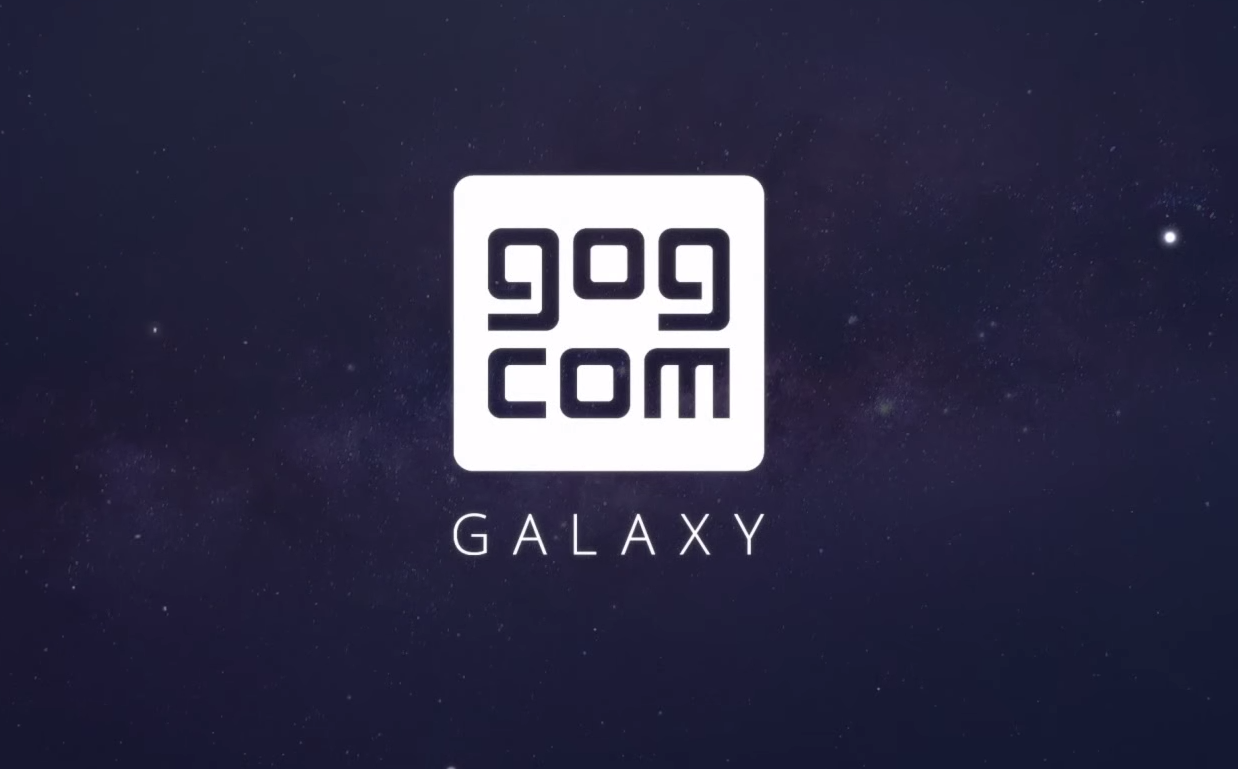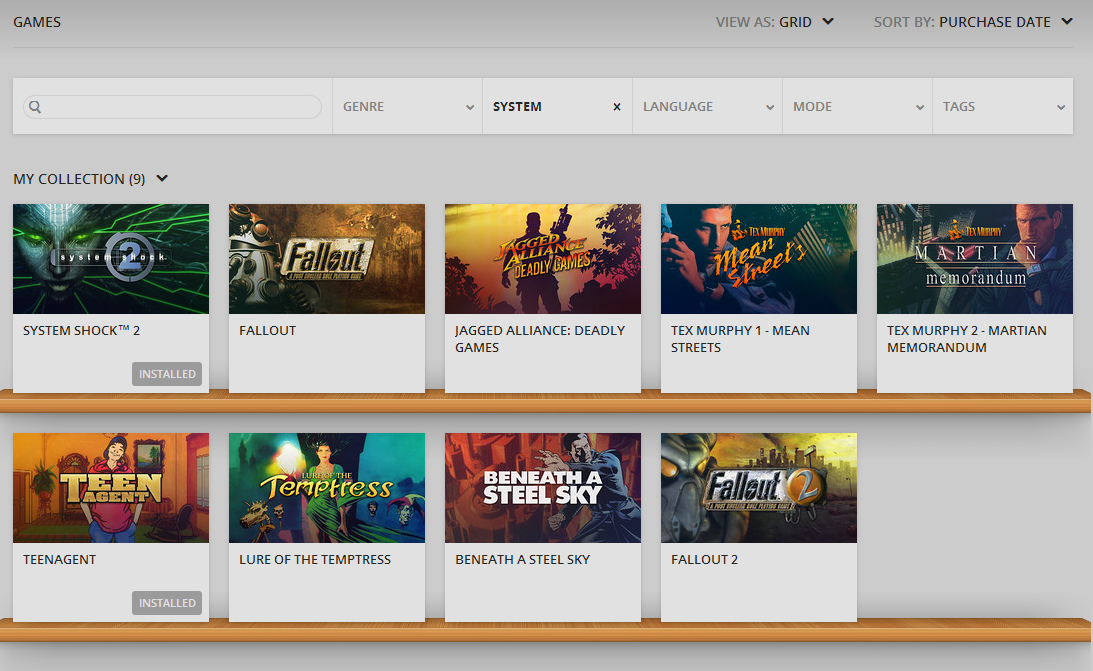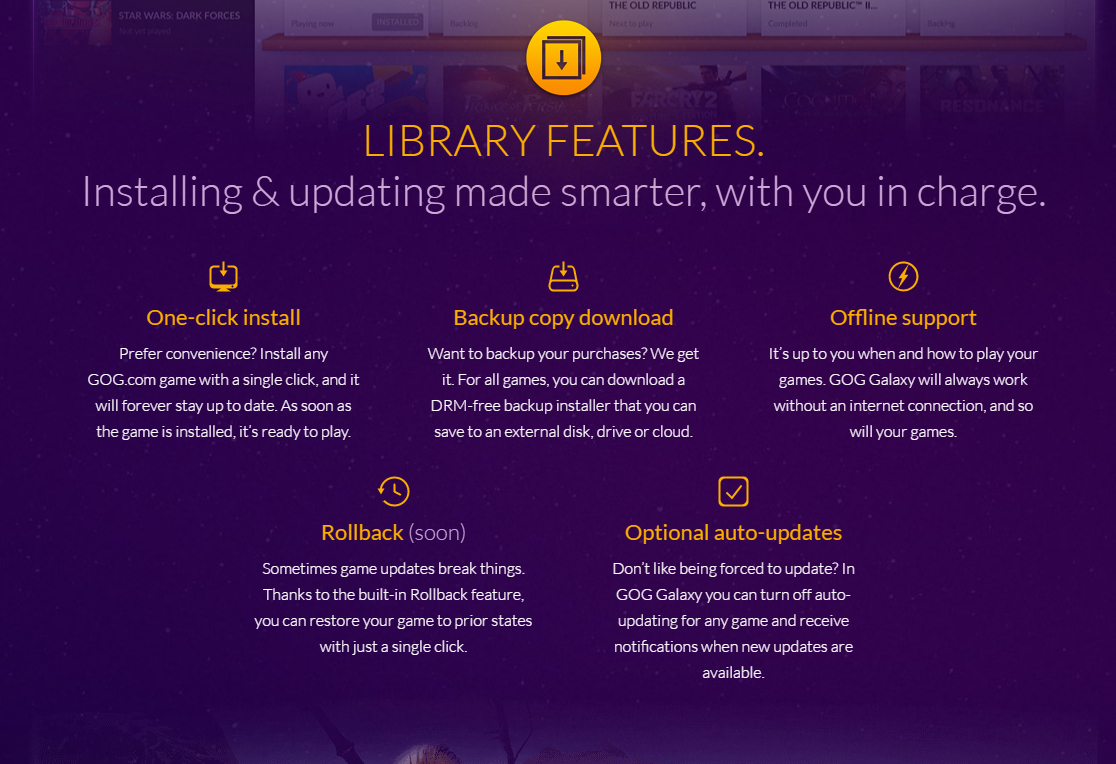GOG Galaxy is a necessary break from Steam's feature creep

On a final visit to my parents’ house before moving to California, I figured I’d dig through The Box, that common basement or attic-bound carriage, typically housing old elementary drawings, school photos, and awkward mementos. In my Box, I dug up a few games, the highlight being the X-Wing Trilogy. I couldn’t get it to run on my laptop, so I packed it up, whined to the air, and left it to the dust and darkness.
When it launched in 2008, GOG’s goal was to harness and enable this nostalgia, to be The Box 2.0, unrestricted by DRM or archaic hardware requirements. The intent was obvious–a pure attempt to keep the box out of the basement, to continually cherish good old games instead of a few times a decade. And without a ubiquitous solution for game archiving, the service drew attention to a growing issue.
Eventually, GOG opened to indies, many deserving of a similar reverence, and eventually opened the gates to all games, new and old. GOG Galaxy, its new game platform, is set to lead the way. It’s touted as “a fully optional client to install, play and update your games,” which isn’t exactly a bold pitch. Currently, it’s in an open beta and its most interesting features have yet to be implemented, but Galaxy is GOG’s attempt at another iteration—a digital expression meant to not only honor the games, but honor the user. Galaxy’s mission is all about versatility, offering a wide feature set, but forcing you into none. Is it enough to stand out from the rest of the desktop client crowd?
Bring back Dewey Decimal
I have 524 games in my Steam library. Of those games, I know that 20 or so are “favorites” and twelve are good “couch fodder.” These are the only tags I currently sort my library by. That isn’t to say I haven’t tried for more. A while back, I went through every game and tagged them using an elaborate set of custom variables. As an unnecessary task, it took far too much brain sweat and time to work out, especially after a botched cloud sync erased my progress.
GOG’s Galaxy has no such problem. Granted, my library is tiny in comparison, but built into the beta are some super obvious and helpful sorting features Steam should’ve had years ago.

I’m able to sort and search my library using the same tools available in the store front. If necessary, I can create my own tags. GOG’s store is more carefully curated than Steam’s wide open floodgates, so I’ve maintained a relaxed vibe digging through personal and potential content. Why Steam hasn’t implemented their own robust sorting tools into user library management is beyond me.
If finding what to play in my own library wasn’t hard enough, finding games in Steam’s store is an ever-growing impossibility. While Valve has taken steps to address its bulbous library, the influx of new games (1518 so far in 2015) has far outpaced their ability to keep up. New games can be tagged, highlighted, recommended, and curated by trusted sources, but even still, I find myself staring down a bottomless well. And no matter how many stones Valve drops, I’ve yet to hear them hit bottom.
Keep up to date with the most important stories and the best deals, as picked by the PC Gamer team.
Thinking forward, looking backwards
Galaxy’s biggest selling point is a feature most people don’t think they need until they need it. Steam’s auto-updates are convenient, yes, but they assume the user has unlimited bandwidth and a consistent internet connection. Once an update starts, you can pause, but never undo them. Until they finish, there’s no playing that game. Even worse, if that patch breaks the game, there’s no way to revert to a working version. GOG Galaxy attempts to solve these problems with the Rollback feature.

While it’s yet to be implemented, Rollback promises an ability to “restore your game to prior states with just a single click.” That means if an update is broken or doesn’t work with your GPU for instance, it can be reverted. No doubt welcome news for speed runners and tinkerers alike, the ability to play a game in its original state or patch by patch even piques my curiosity. I haven’t tested it out, but the promise is enough to keep me on board until I can.
Steam allows for backups of games, but the option is obfuscated through menus and options. Most users don’t take advantage because they simply don’t know about it. GOG Galaxy has a front-facing backup feature that sits in every game’s library page. It’s a huge relief to see a desktop client anticipating common PC problems and embedding solutions in easy to reach spaces.
Optional client(ele)
The problem with pitching a client and its entire feature set as “optional” means that consistency gets thrown out in favor of convenience. A typical user can expect their games to function, they can expect achievements, rollback, sorting features, social features, but if they’re all touted as optional, how slick can we expect any of them to be?
Front end library management might be easy enough, but Galaxy’s back end is where things get messy. One of our editors was asked where his GOG games were located after installing Galaxy, a small hurdle. And when I tried to access GOG’s “included goodies” for System Shock 2 (wallpapers, manual, interviews, etc.), the game downloaded them when prompted, but didn’t present a way to access the content. I had to dig through my install folders to get there. The trouble was authentic to the year 1999, but jarring to experience in 2015. At least I can do as I please with those files. They’re not encrypted or hidden away. I can move them around, change their names, associations, or ignore them completely. Choice!
Steam's shotgun approach means whatever sticks isn’t necessarily good, and whatever doesn’t stick dies or horribly mutates.
But if there ever was a time to misappropriate a Sylvia Plath quote, it’s either here or a dating profile. For some, GOG Galaxy will be the nebulous fig tree:
“I saw myself sitting in the crotch of this fig tree, starving to death, just because I couldn't make up my mind which of the figs I would choose. I wanted each and every one of them, but choosing one meant losing all the rest, and, as I sat there, unable to decide, the figs began to wrinkle and go black, and, one by one, they plopped to the ground at my feet.”
Choice is great, but can be paralyzing. Where does the feature creep end for Galaxy? Will support continue for their various modules if only a miniscule portion of the user base takes advantage of them? How many figs shrivel and die when there are so many to consider? Will they rescind my English degree for this?
Out of Steam
But the more I’ve considered what Steam is becoming, the more GOG Galaxy appeals. Step back and think about Steam’s feature creep over the last few years. Think about what is considered ‘community’ and ‘economy.’
Valve put out a card crafting system that doesn’t gauge involvement with a game, merely the time it’s spent running. From there, we’re encouraged to sell or trade these cards to make badges that express–well, I’m not entirely sure. Nearly all of my friends say they just sell their cards immediately. And what’s it all for? How does this engage me with a community in a meaningful way? These obscure ‘features’ are spun by Valve as some of their most genius output, but I can’t think of a single way they’ve enriched my experience with a given game.
Steam is trying to be everything, all at once. The shotgun approach means whatever sticks isn’t necessarily good, and whatever doesn’t stick dies or horribly mutates. Steam can spread itself thin because it has a major foothold already, but it's in serious need of a gutting. A fig trim. A true refresh.

Nothing is everything
As it stands, it’s difficult to argue Galaxy as a must-use client for games. But that’s fine. The beta client is hardly Galaxy’s final form. Steam is only a ‘must use’ for me because of its massive library and the social trenches I’ve worn into it over the last 10 years. I can’t envision myself using Galaxy’s friends list or digging deep into community features unless I have to. Steam already has far more robust functionality in that regard, and the majority of folks I play games with use Steam as a primary mode of communication.
But I think Galaxy is great—it never gets in the way of how I want to play my games. And yeah, there’s a tangible sense of ownership when I can play the games offline or outside the client. GOG doesn’t want to shape and direct the user experience. They leave it up to choice, not swayed by ill figs.
Galaxy won’t make a huge splash. Which is fine, I think. My ultimate hope is that Galaxy finds a niche snugly next to Steam’s social features, but embraces GOG’s established reverence for archival and DRM-free conveniences. Galaxy should act as a series of signposts for the DRM-free gamer. It should hardly interface with any of your games beyond a minimal overlay. I’m all for sacrificing fluidity for principle.
Give me the vinyl record player of game clients: unnecessary, less convenient perhaps, but novel, personal, and full of exploitative achievements (if you want).
James is stuck in an endless loop, playing the Dark Souls games on repeat until Elden Ring and Silksong set him free. He's a truffle pig for indie horror and weird FPS games too, seeking out games that actively hurt to play. Otherwise he's wandering Austin, identifying mushrooms and doodling grackles.


